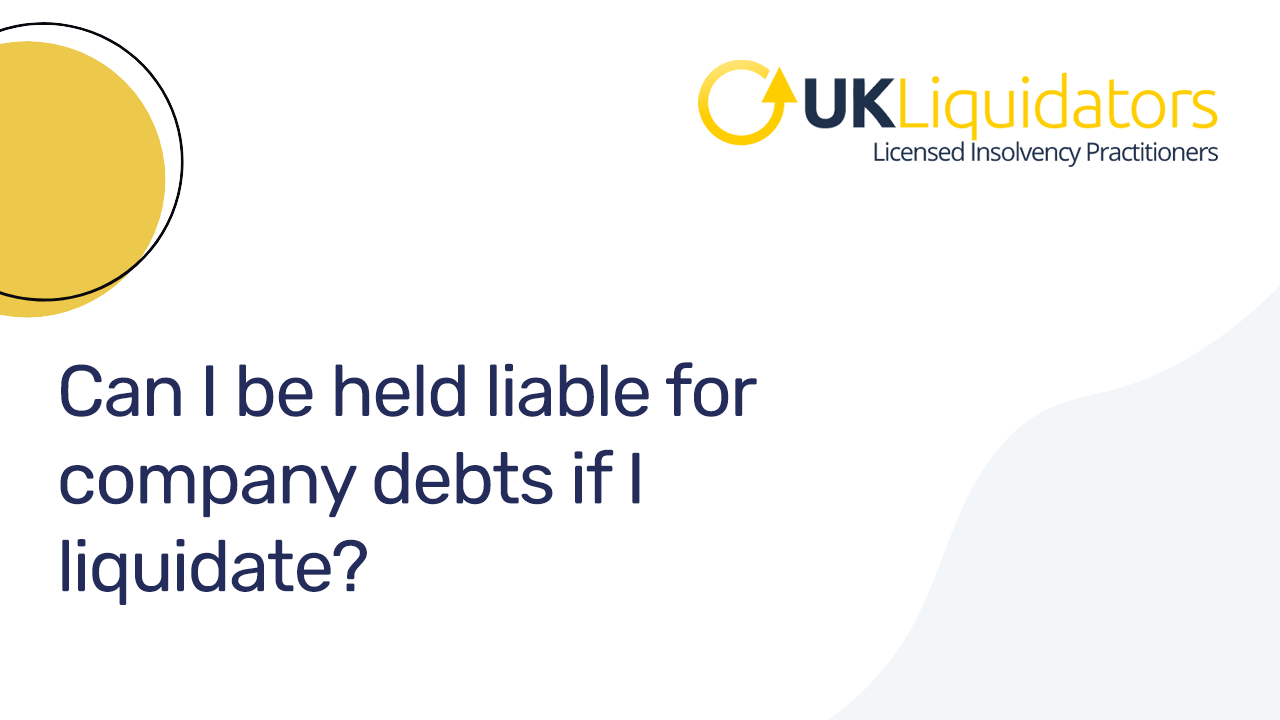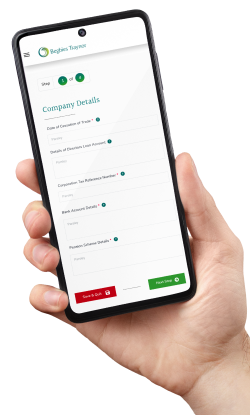Directors are generally not personally liable for company debts, as limited companies are separate legal entities from their directors and shareholders. However, personal liability can arise if directors provide personal guarantees for company debt, commit fraud, trade wrongfully, or breach their fiduciary duties. During a formal insolvency process, director conduct is reviewed, and directors may face personal responsible for company debts if found at fault.
If your limited company enters insolvent liquidation, under normal circumstances you’re protected from personal liability for company debts due to something called limited liability.
Limited liability acts as a ‘veil of separation’ and is part of the limited company structure in the UK. This provides a legal separation from you as a company director from the affairs of your limited company. Simply put, your limited company is its own legal entity; the debts of the company belong to the company and not you as an individual.
While limited liability provides valuable protection in the event of the company becoming insolvent, there are some instances in which a director can become personally liable for company debts during insolvent liquidation, however, and it’s worth knowing when this can happen and how it might affect you.
So what happens to company debts in a ‘typical’ liquidation scenario?

When a company enters insolvent liquidation by way of a Creditors' Voluntary Liquidation (CVL) process. any assets it owns are sold by the liquidator to generate funds which are then used to repay outstanding creditors. Once all creditors have been repaid as far as funds allow, any company debts which remain outstanding and unpayable at that point are written off.
Directors - particularly those who are worried that their company may be at risk of becoming insolvent - should be aware of the exceptions to this rule and know the situations when directors can find themselves personally responsible for repaying the debts of their limited company.
Concerned about the National Insurance increase?
For the 2024-25 tax year, the rate of employer National Insurance increases from 13.8% to 15% adding yet more pressure onto already squeezed cash flows. If you are worried about the impact this could have on your company’s finances, talk to the experts at UK Liquidators. As licensed insolvency practitioners we can explain your options and help you plot a way forward. Call today on 0800 063 9262.
The most common way of directors finding themselves liable for company debts is when a personal guarantee has previously been provided to secure the borrowing. For many directors, particularly those running smaller or start-up companies, they may find that the only way to access business borrowing is to sign a personal guarantee to underpin the loan.
While the company is active and able to meet the monthly repayments, the personal guarantee has no impact on the directors. It is only if the company becomes insolvent and enters into a formal liquidation process that the personal guarantee will 'crystalise' and the responsibility for repaying the loan will pass to the directors.
The lender can enforce this debt by pursuing you through the courts, making you bankrupt, and using the asset on which the guarantee is secured to recover their money. Clearly, this can have serious implications on your personal financial situation if you are unable to settle the outstanding balance with the loan provider.
Liquidation Portal
For Company Directors

There are various other scenarios that could result in personal liability for directors during insolvent liquidation, generally centred on misconduct or some form of wrongdoing when trading.
This could range from unknowingly placing creditors at greater risk of loss by continuing to trade when knowingly insolvent, to making deliberate attempts to defraud creditors or avoid repayment. Here are just a few examples:
Directors often believe they can improve their company’s financial position by continuing to trade, even when they’re insolvent. In reality, however, this can lead to creditors suffering further losses.
This is called wrongful trading, and it means you’ve failed to place the interests of your creditors first, which is a legal obligation when you knowingly become aware that the company has become insolvent. In this case, you and other directors could become personally liable for these additional losses if it can be proven that your actions worsened the position of creditors.
To protect yourself from allegations of wrongful trading, you should make it a priority to seek the guidance of a licensed insolvency practitioner at the earliest possible opportunity. By being proactive at the first signs of insolvency, you are demonstrating your desire to protect creditors and adhere to your legal duties as the director of an insolvent limited company.
Antecedent transactions are those that have negatively affected the company’s financial situation and caused additional losses to certain creditors.
Examples include making preferential payments to certain creditors at the expense of others, or selling or otherwise disposing of company assets at an undervalue. If you are found guilty of entering into an antecedent transaction, this could result in the transaction being reversed by a liquidator and you ordered to make a compensation order to creditors.
Deliberately defrauding creditors is a serious offence and can result in personal liability for some or all company debts. Fraudulent trading can also result in disqualification as a director for up to 15 years, and in the most serious cases, a prison sentence.
Worried about your Bounce Back Loan?
If you are a limited company director worried about how you are going to repay your Bounce Back Loan, we are here to help. As licensed insolvency practitioners we can talk you through your options when it comes to repaying your outstanding Bounce Back Loan, as well as handling all negotiations with creditors on your behalf. Call our team today on 0800 063 9262 .
One of the most important aspects of company insolvency is prioritising creditor interests over your own, and those of your company. You need to show that you’ve protected creditors from further losses by seeking professional help at the earliest stage possible. If the business is beyond rescue, it will need to be liquidated.
For more information on personal liability or any other liquidation issue, please contact one of our partner-led team at UK Liquidators. We have over 25 years’ experience of company liquidation, and can provide the reliable professional advice you need. With an extensive network of offices nationwide, we can arrange a free same-day consultation to quickly assess your best options.
By completing the test, you will receive:
If you are considering liquidation for your company, taking expert advice at an early stage is crucial. At UK Liquidators, our team of licensed insolvency practitioners are committed to providing limited company directors with the help and advice they need to make an informed decision.




Looking for immediate support?
Complete the below to get in touch